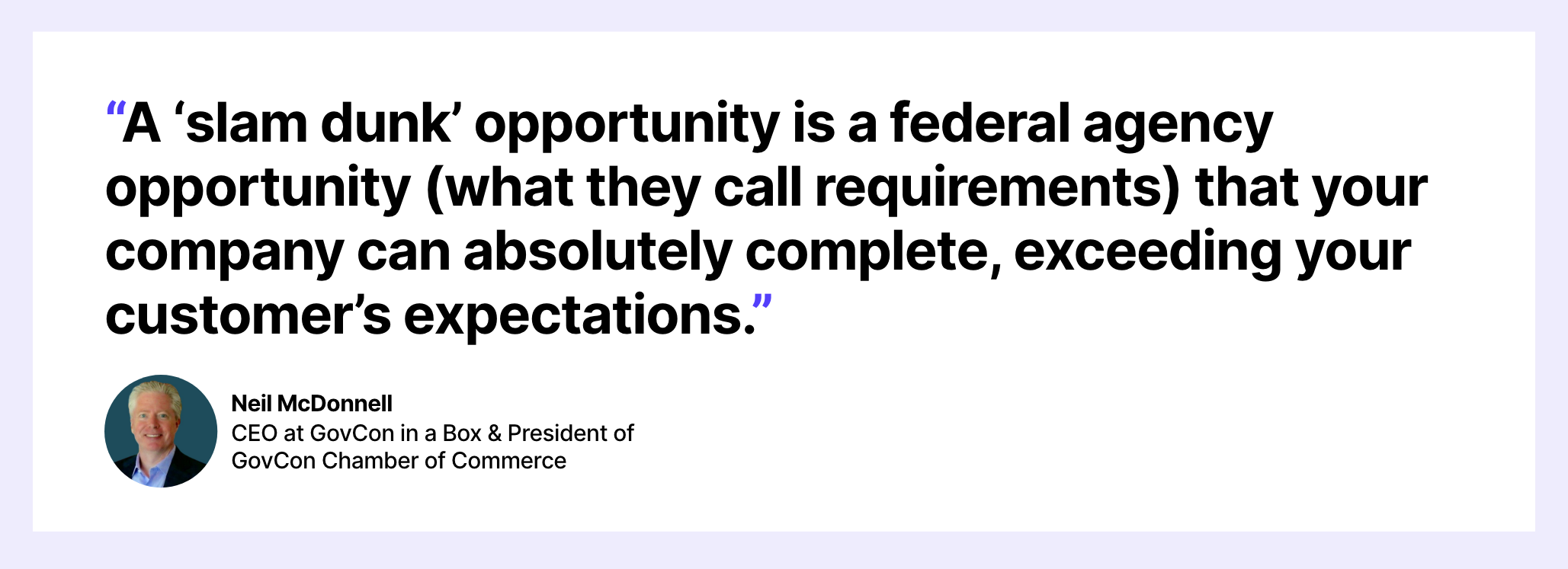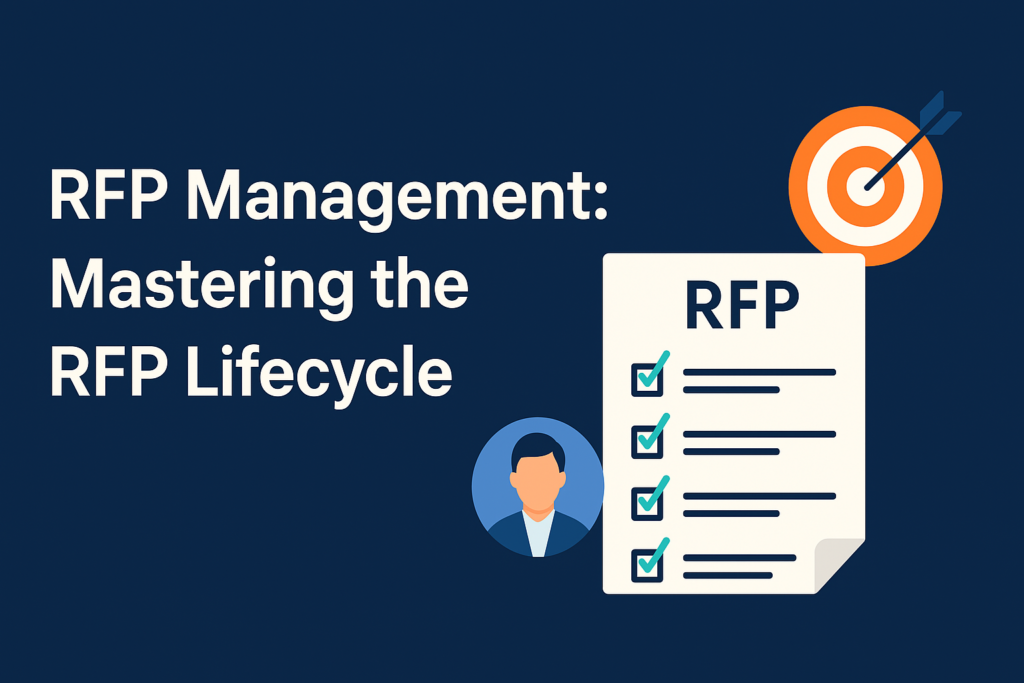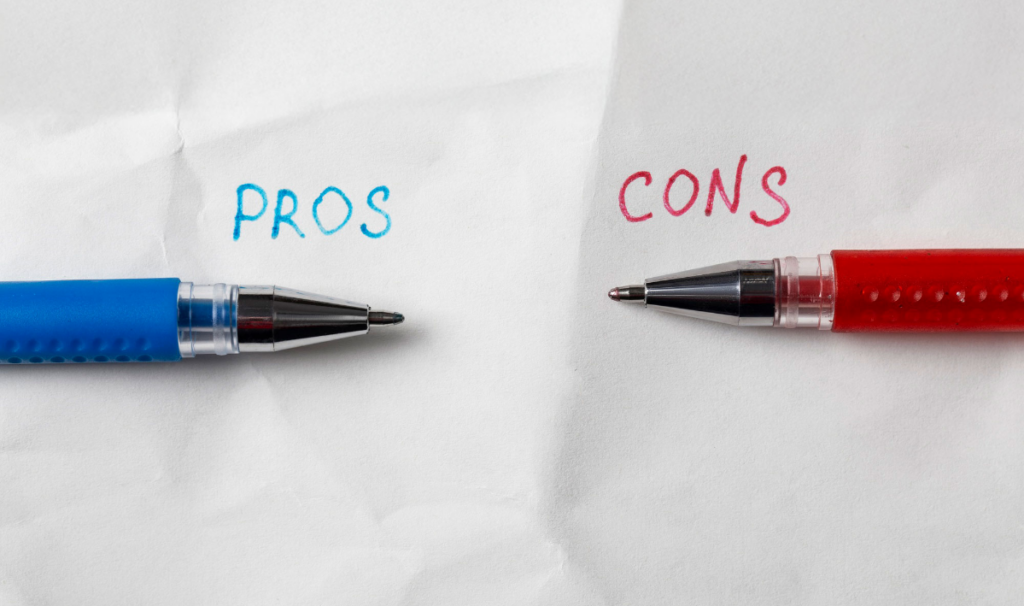In this article, I define the criteria you must put in place to ensure only ‘Slam Dunk’ opportunities enter your federal sales pipeline.
What is a ‘Slam Dunk’ Federal Opportunity?

‘Slam Dunk’ opportunities feel like they were written specifically for your company.
Or at least they seem to be.
You and everyone in your company see the opportunity and immediately say, “Yes, this is perfect for us.”
No one says “This looks like it might be perfect for us.”
You shouldn’t need to rationalize why it might be a good fit. It should just be obvious.
It's not a 'Slam Dunk' opportunity for you if you have to rationalize the fit.
Neil McDonnell
Why Pursuing ‘Slam Dunk’ Federal Opportunities Make Sense
- ‘Slam Dunk’ opportunities focus your company’s energy and efforts
- You will significantly increase your chances of winning / Probability of Win (PWIN)
- It becomes easier for others to tell you about opportunities because they know your ‘Slam Dunk’
- You will be able to respond very quickly to Request for Informations (RFI) and RFPs because you will develop reusable content
- When you start winning contracts around your ‘Slam Dunk’ you start having more and larger Past Performances which helps you pursue even larger contracts
Your ‘Slam Dunk’ Federal Opportunity Checklist
Below I provide you two checklists to help you identify ‘Slam Dunk’ opportunities.
Criteria for a ‘Slam Dunk’ Opportunity Checklist
There are only three things you must validate with an opportunity, but they must all be met in order for the opportunity to be a ‘Slam Dunk’ for your company.
- 60% or more of the task areas must align with your core competency
- The opportunity must be within your target agency / department
- The RFP must be expected to drop 3 or more months from today
Some thoughts on each…
- My last company we were Microsoft SharePoint experts – that was our ‘Slam Dunk’. SharePoint was part of a suite of software called Microsoft O365 – so that would be a stretch for us. But if we saw a software development opportunity and started saying how it’s like SharePoint, then we’d recognize we were rationalizing.
- One of the hardest things to do is pick one, large agency or department and pursue work relentlessly in there instead of pursuing many agencies / rabbits. So, my target agencies (because we were larger) were the Veterans Affairs (VA) and United States Air Force (USAF). Any other agency and it wasn’t a ‘Slam Dunk’.
- Saying a ‘Slam Dunk’ RFP’s drop date is 3+ months out gives us enough time to pursue / capture. If it isn’t that far out, then it isn’t a ‘Slam Dunk’.
Just because we define a 'Slam Dunk' doesn't mean we can't make exceptions. It just means we have to realize the chances of winning are dropping not rising.
Neil McDonnell
Criteria That Do Not Matter
I know the instinct is to say the following should be part of a ‘Slam Dunk’ criteria, but they do not.
The following list are important but only tell us whether we would prime or subcontract.
- Small Business Tags (just team with someone who has the tag)
- Contract Vehicles (team with someone who does have that vehicle)
- Very Large Total Contract Value (team under a larger prime contractor and support the work)
Final Thought on Identifying ‘Slam Dunk’ Opportunities
This is Business Development (BD) not Capture.
Identifying and qualifying opportunities are the earliest activity. You need to make sure your company is only working on opportunities that you ‘should‘ be able to win.
I used to do the qualify process for ‘Slam Dunk’ opportunities and it could take hours to fully review a requirement.
Now we’ve built a tool we’re beta testing that does it in minutes and I’m looking forward to showing you that.
For now… review your pipeline using the three criteria above.
P.S. We’re working with Department of Defense (DoD) and other departments to get small businesses to increase their Federal Visibility Score. Check out GovCon in a Box.




